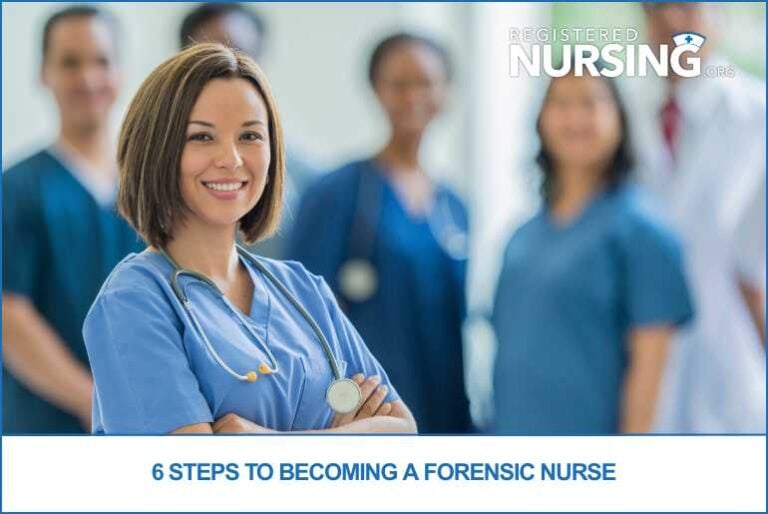6 Steps to Becoming a Forensic Nurse
- Step 1: Earn Your Registered Nurse (RN) License
- Step 2: Gain Clinical Nursing Experience
- Step 3: Complete a Forensic Nursing Training Program
- Step 4: Obtain SANE Certification (Optional but Recommended)
- Step 5: Apply for Forensic Nursing Positions
- Step 6: Continue Learning and Growing in the Field
- Chart Your Path to a Fulfilling Forensic Nursing Career
- Sources
- Latest Articles & Guides

According to the U.S. Department of Justice, nearly half a million people experience sexual assault in the U.S. each year. Behind every case is a need for medically sound evidence collection and trauma-informed care. Forensic nurses serve a vital role in supporting survivors and guiding legal outcomes. As a bridge between healthcare and the justice system, they combine clinical expertise with investigative skills to deliver compassionate, evidence-based care.
The path to becoming a forensic nurse is both achievable and profoundly impactful. Whether you’re just beginning your nursing education or seeking a meaningful new direction, forensic nursing offers a chance to make a real difference. This guide outlines six comprehensive steps designed to help you navigate your journey toward certification, specialized training, and employment in this critical field. By mastering each phase, you’ll be equipped to advocate for vulnerable patients and contribute to justice in communities nationwide.
Step 1: Earn Your Registered Nurse (RN) License
Becoming a forensic nurse begins with earning your RN license, the fundamental credential for practicing nursing in the U.S. This step involves completing an accredited nursing program and passing the NCLEX-RN exam, which ensures you meet national standards for safe nursing practice.
Education Pathways to RN Licensure
| Degree | Duration | Typical Format |
| Associate Degree in Nursing (ADN) | 2 years | In-person or hybrid |
| Bachelor of Science in Nursing (BSN) | 4 years | In-person or hybrid |
| Accelerated BSN (for non-nursing degree holders) | 12–18 months | Intensive, full-time |
Choosing the BSN pathway often leads to better job prospects, especially in specialized nursing roles like forensics. It also lays a strong foundation for future graduate-level education. The American Association of Colleges of Nursing (AACN) offers resources to help evaluate program quality and national standards.
Step 2: Gain Clinical Nursing Experience
To become a forensic nurse, hands-on experience is essential. Working in direct patient care settings builds your clinical competence and emotional resilience—two core attributes required in forensic practice.
Nurses interested in this specialty often spend several years in high-acuity settings like emergency departments, intensive care units, or psychiatric facilities. These roles prepare you to recognize trauma patterns, respond to victims with empathy, and manage fast-paced environments.
Valuable Experience Areas
- Trauma and emergency care
- Mental health and substance abuse treatment
- Pediatric and geriatric care
- Crisis intervention and patient advocacy
Additionally, many forensic nurses find it helpful to work with social services or legal advocacy groups early in their careers. Volunteering for domestic violence shelters, sexual assault response teams (SART), or local crisis hotlines can provide first-hand exposure to the population you’ll ultimately serve.
Step 3: Complete a Forensic Nursing Training Program
Once you’ve gained foundational nursing experience, the next step is enrolling in a forensic nursing education program. These programs offer the legal knowledge, clinical expertise, and ethical frameworks needed to work effectively with victims and the legal system.
Forensic Nursing Education Options
| Program Type | Description | Offered By |
| Certificate in Forensic Nursing | Post-RN credential; covers legal and medical aspects | Universities, online platforms |
| MSN in Forensic Nursing | Master's-level degree for leadership and advanced roles | Nursing schools with forensic tracks |
| Continuing Education Units (CEUs) | Short courses for skill-building and licensing prep | Professional organizations (e.g., IAFN) |
When selecting a program, look for accreditation, experienced faculty, and clinical partnerships with hospitals or advocacy organizations. Many forensic nurses also choose programs that offer flexible formats, allowing them to work while completing their studies. The International Association of Forensic Nurses (IAFN) lists educational resources and CEUs for aspiring forensic nurses.
Step 4: Obtain SANE Certification (Optional but Recommended)
Sexual Assault Nurse Examiner (SANE) certification is a nationally recognized credential that sets you apart in the forensic nursing field. SANEs are often the primary medical professionals responsible for examining sexual assault victims and collecting forensic evidence for legal cases.
The International Association of Forensic Nurses (IAFN) administers two main types of SANE certification:
- SANE-A: Adult/Adolescent
- SANE-P: Pediatric
Certification Requirements
- Active RN license
- 40-hour didactic SANE training (online or in-person)
- Supervised clinical practice with a qualified preceptor
- Passing a comprehensive certification exam
SANE certification also prepares you to testify in court, an important responsibility in many forensic nursing roles. It demonstrates your commitment to evidence-based practice and patient-centered care. Some states and hospitals require SANE credentials for forensic nursing employment, especially in sexual assault response teams.
Step 5: Apply for Forensic Nursing Positions
With specialized training and certification in hand, you’re ready to begin job hunting. Forensic nurses are needed in a wide range of settings, from urban hospitals to rural advocacy programs. Many also work closely with multidisciplinary teams, including law enforcement, social workers, and legal professionals.
| Work Setting | Description |
| Emergency departments | Care for trauma victims and collect initial evidence |
| Advocacy centers | Provide support services for sexual assault and abuse victims |
| Correctional facilities | Conduct assessments and document inmate injuries |
| Medical examiner’s offices | Assist with death investigations and documentation |
| Community outreach programs | Offer care and education in underserved areas |
Tips to Land Your First Job
- Highlight forensic training, trauma experience, and certifications in your resume and cover letter
- Join the IAFN to access job boards and network with professionals
- Apply for part-time, per diem, or on-call positions to get started
- Attend forensic nursing conferences and participate in job shadowing opportunities
Case example: A newly certified SANE nurse in a mid-sized city starts in a part-time role with the local sexual assault response team. Within a year, her responsibilities expanded to include courtroom testimony and training emergency room staff in trauma-informed care.
Step 6: Continue Learning and Growing in the Field
Forensic nursing is a dynamic and ever-evolving specialty. Staying updated on new laws, medical procedures, and ethical practices is essential to maintaining your skills and delivering quality care.
Opportunities for Professional Development
- Attend continuing education workshops and national conferences (e.g., IAFN's Annual Conference)
- Subscribe to peer-reviewed journals like the Journal of Forensic Nursing
- Pursue related certifications (e.g., legal nurse consulting, forensic psychiatry)
- Mentor junior nurses or contribute to policy development on victim rights
Many forensic nurses also become educators, policy advocates, or expert witnesses. The career trajectory is broad and flexible, offering long-term growth for those committed to lifelong learning and interdisciplinary collaboration.
Chart Your Path to a Fulfilling Forensic Nursing Career
Choosing to become a forensic nurse means embracing a career rooted in empathy, justice, and advocacy. It's a profession that asks for clinical precision and emotional resilience—and gives back in purpose, impact, and professional opportunity.
By following these six steps, you'll be prepared to meet the unique challenges of forensic nursing and support some of the most vulnerable members of society. Whether you work in a hospital, courtroom, or outreach clinic, your role will matter deeply.
Start your journey today. Take the next step toward becoming a forensic nurse and help bring healing and justice together, one patient at a time.
Sources
- U.S. Department of Justice
- American Association of Colleges of Nursing (AACN)
- International Association of Forensic Nurses – Education
- International Association of Forensic Nurses – Certification
- Journal of Forensic Nursing
Latest Articles & Guides
One of the keys to success as a registered nurse is embracing lifelong learning. Our articles and guides address hot topics and current events in nursing, from education to career mobility and beyond. No matter where you are on your nursing journey, there’s an article to help you build your knowledge base.
Browse our latest articles, curated specifically for modern nurses.



